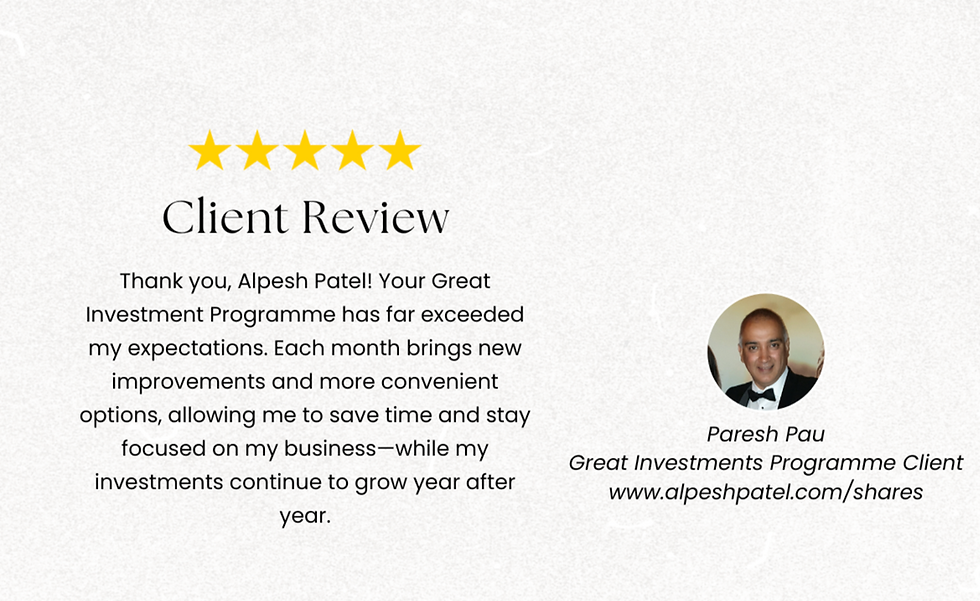Why Doesn’t Every Fund Do This?
- Alpesh Patel
- Aug 21, 2025
- 3 min read
When clients see the performance of my Great Investments Programme, the question is inevitable: “Why doesn’t every fund do this? You can’t be the only clever person.”

It’s a fair challenge – and the answer reveals much about how the investment industry actually works.
First, let’s kill the myth that investment managers spend their days scouring markets for the best opportunities.
Most large funds are not designed to find the next great investment. They are designed to gather assets.
Why? Because fund managers are paid on the percentage of money they manage, not the percentage they make for you. A billion under management at 1% fees is a £10 million annual business – regardless of whether your portfolio grows or not.
This leads to “career risk” investing. If you’re a manager at BlackRock or Fidelity and you hug the benchmark, you’ll never be sacked for being wrong with everyone else.
But if you take bold, evidence-based positions and they go against you, you’ll be out of a job faster than you can say “FTSE tracker.” So the incentive structure favours mediocrity, not outperformance.
Second, size is an enemy of agility. Warren Buffett himself admits that Berkshire Hathaway’s sheer scale makes it impossible to deliver the returns he achieved in his early years.
A £50 billion fund can’t easily take a meaningful position in an overlooked mid-cap stock or a specialist ETF. It’s like trying to steer an oil tanker into a narrow harbour – whereas my programme is more like piloting a speedboat. We can move fast, take decisive positions, and exploit opportunities that lumbering giants simply cannot.
Third, regulation and bureaucracy. Large funds operate under layers of compliance committees, investment boards, and risk managers.
Their role is to avoid embarrassment rather than pursue excellence. This is why many portfolios end up looking suspiciously alike – everyone owning the same “Magnificent Seven” tech stocks, everyone underweight in the same unfashionable sectors. It’s not innovation; it’s groupthink.
Finally, let’s not pretend I’m “the only clever person.” Far from it. The Programme stands on the shoulders of giants.
We systematically filter ideas from the world’s best hedge funds and global banks – firms with teams of PhDs and billions of dollars of research budgets.
But unlike the average investor, I don’t take their recommendations at face value.
We run them through our own proprietary criteria: value, growth, risk-adjusted returns, Sortino ratios, and yes, common sense. Think of it as curating the world’s best ideas rather than reinventing the wheel.
So why doesn’t every fund do this? Because they can’t – not with their incentives, their size, and their constraints. It’s not that others aren’t clever. It’s that the system is not designed to deliver the kind of focus, agility, and independence that the Great Investments Programme is built on.
Investing is not about being the only smart person in the room. It’s about being willing to think and act differently when the crowd is paralysed. That’s why this Programme exists – and why it doesn’t look like every other fund.
Alpesh Patel OBE
Disclaimer: The value of investments and the income from them can go down as well as up, and you may not get back the amount originally invested. Past performance is not a reliable indicator of future results. This content is provided for educational purposes only and does not constitute financial advice.









Comments